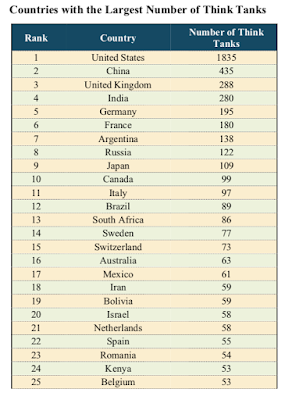In a recent discussion about the world of think tanks, Dr. Robert Farley raised a question about the think tank culture in Korea. It reminded me of a list I found a few years ago when I was trying to understand the scope of the industry in the US. What I was looking for was a directory or who's who of the think tank world. Unsurprisingly, there are two places that I've found where one can learn more about the sector as a whole.
One is this amazing annual report produced by the University of Pennsylvania's Think Tanks & Civil Societies Program (TTCSP) called the 2016 Global Go to Think Tank Index Report (17Mb PDF). This report draws from a database of over 6500 think tanks and uses a four-stage nominating and ranking process that invites the entire community of institutions plus 7500+ journalists, donors and policy-makers to create a comprehensive set of rankings of the best organizations around the world. The two images below are just a tiny sample of the volumes of interesting information one can cull from the document.
Another great place to track the think tank world is Think Tank Watch. They include the TTCSP rankings as well, but as a blog produce a lot of interesting news about think-tank happenings.
While this year's global top ten rankings are dominated by US institutions, South Korean institutions appear on nearly every ranking list, and some of those placements are exceptional. It's clear that the S. Korea is able to produce world-class think tanks in economics, development, and defense. There are simply too many notable appearances to list here. A cursory survey of some of the ranking lists shows that three South Korean think tanks repeatedly appear in the top 10, 25, or 50 of many lists. South Korean think tanks even hold a few #1 placements.
The Korea Development Institute (KDI) took sixth place for Top Think Tanks Worldwide (Non-US), 44th Worldwide (US & Non-US), and #1 in a list specific to China, Japan, India and Republic of Korea. It is the #1 International Development Think Tank in the world, #11 in International Economics, #11 Best Managed Think Tank, and appears on seven other top lists.
The #3 placement on the top Asian think tanks (China, Japan, etc.) is Korea Institute for International Economic Policy (KIEP). KIEP is fifth for Top International Economics Think Tanks and appears on 15 or so lists throughout the rankings.
Another name I saw often was IFANS, or the Institute of Foreign Affairs and National Security. They were ranked #7 on Think Tanks to Watch in 2017, #57 for Foreign Policy and International Affairs, #35 for Defense and appeared on a few other lists.
South Korean think tanks hold a very strong presence when compared to China, Japan, and India, behemoth countries with incomparably large economies. The #1 and #3 best think tanks in the region are South Korean, as mentioned above. Four of the top fifteen, and seven of the top fifty on that list sit just below the 38th parallel. If the beltway ever needed a selfish reason to care about the DPRK missile threat, it could find one in the impressive brain-trust that thrives under the sword of Damocles called Hwasong-6.
**Spoiler Alert** The best think tank in the world in 2017 is select area to the right --> Chatham House in the UK.


No comments:
Post a Comment